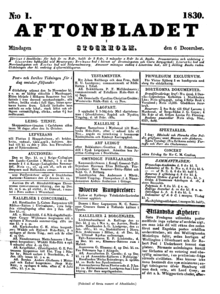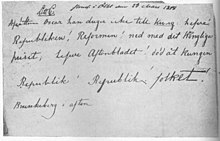Aftonbladet
You can help expand this article with text translated from the corresponding article in Swedish. (August 2018) Click [show] for important translation instructions.
|
 | |
| Type | Daily newspaper |
|---|---|
| Format | Tabloid |
| Owner(s) | LO (9%) Schibsted (91%) |
| Founder(s) | Lars Johan Hierta |
| Publisher | Lena K Samuelsson |
| Editor-in-chief | Lena K Samuelsson |
| Founded | 6 December 1830 |
| Political alignment | Independent social-democrat |
| Language | Swedish |
| Headquarters | Västra Järnvägsgatan 21, Stockholm |
| Circulation | 154,900 (print, 2014) 250.000 (digital, 2018) |
| ISSN | 1103-9000 |
| Website | aftonbladet |




Aftonbladet (Swedish: [ˈâftɔnˌblɑːdɛt], lit. "The evening paper") is a Swedish daily tabloid newspaper published in Stockholm, Sweden. It is one of the largest daily newspapers in the Nordic countries.[citation needed]
History and profile
[edit]The newspaper was founded by Lars Johan Hierta in December 1830 under the name of Aftonbladet i Stockholm[1][2][3] during the modernization of Sweden. Often critical and oppositional, the paper was repeatedly banned from publishing. However, Hierta circumvented the bans by constantly reviving the paper under slightly modified names, as, legally speaking, a new publication. Thus, on 16 February 1835, he issued the first edition of New Aftonbladet, which would – after yet another ban – be followed by Newer Aftonbladet, in turn followed by Fourth Aftonbladet, Fifth Aftonbladet, and so on.[4] In 1852 the paper began to use its current name, Aftonbladet, after a total of 25 name changes.[1] It currently describes itself as an "independent social-democratic newspaper."[citation needed] Augusta Barthelson often wrote small stories in the newspaper.
The owners of Aftonbladet are the Swedish Trade Union Confederation (LO) which bought it in the 1950s[5] and Norwegian media group Schibsted, which acquired its share in the paper in the late 1990s.[6] LO sold a large part of its shares in the paper to the Schibsted group.[7] As per 15 June 2009 Schibsted bought another 41% and became the majority owner with 91%.[8] However, LO has the right to appoint the political editor of the paper.[7]
Aftonbladet, based in Stockholm,[3] is published in tabloid format.[9] The paper reported news and also criticised the new Swedish king Charles XIV John. The king stopped Aftonbladet from being printed and banned it. This was answered by starting the new newspaper "Det andra Aftonbladet" (The second Aftonbladet), which was subsequently banned, followed by new versions named in similar fashion until the newspaper had been renamed 26 times, after which it was allowed by the king.[10]
During its existence, Aftonbladet has leant in different political directions. Initially liberal, it drifted towards conservatism under Harald Sohlman, editor in chief from 1890 to 1921.
In 1929, the newspaper came under the control of the Kreuger family, when a majority of the shares was bought by Swedish Match, at that time the heart of Ivar Kreuger's corporate empire. Aftonbladet was labeled "neutral". In 1932 it backed Per Albin Hansson's new Social Democratic government. Just a few years later it realigned with the Liberal Party and turned to advocate liberal politics. Heavily influenced by pro-German staff members, the newspaper supported Germany during World War II.[11]
The Kreuger era came to an end on 8 October 1956. Despite interest from both the Liberal Party and the Centre Party, Torsten Kreuger sold Aftonbladet as well as Stockholms-Tidningen to the Swedish Trade Union Confederation.[12] Since then, the editorial line has been supportive of the Social Democrats. The ownership change was first followed by a slight drop in circulation. In the 1960s, however, the newspaper saw its circulation surge rapidly, peaking at 507,000.
By the early 1990s Aftonbladet had run into economic problems, and many had begun to question the competence of the trade union movement as a media owner. On 2 May 1996, the Norwegian media group Schibsted acquired a 49.9 percent stake in the newspaper. The Swedish Trade Union Confederation kept the remaining 50.1 percent of its shares. The same year its circulation passed that of long-time tabloid rival Expressen. In 2005 Aftonbladet started a Web portal for business news as a joint venture with Svenska Dagbladet.[13]
In 1998, the circulation of Aftonbladet was 397,000 copies on weekdays and 502,000 copies on Sundays.[14] The circulation of the paper was 402,000 copies in 2001.[9] As of 2004 the paper was the most selling daily both in Sweden and in other Nordic countries, having a circulation of 422,000 copies.[2] It was 429,000 copies on weekdays in 2005.[15] In 2006 the paper had 1,425,000 daily readers (Orvesto research 2005:2), circa 15% of the Swedish population. The paper had a circulation of 310,900 copies in 2010.[16] It had a circulation of 154,900 copies in 2014.[17]
The journalistic quality of Aftonbladet and other tabloid newspapers has sometimes been questioned. In late 2006, the paper's own journalist Peter Kadhammar criticized the paper's treatment of the love life of Swedish tabloid celebrity Linda Rosing as equally important to the war in Iraq.[18]
However, Aftonbladet has drawn more attention for the strident left-wing stance and controversial publications of its cultural section. Under former culture editor Åsa Linderborg, the cultural section was criticized by pro-Israel groups for taking an anti-Israeli stance, and in some instances Linderborg was accused of publishing opinion pieces that alluded to anti-Semitic concepts.[19][20][21][22][23][24] Linderborg was also criticized over a series of articles relating to Russia, and there have been persistent allegations that the cultural section has promoted pro-Moscow narratives, including on the Russo-Ukrainian War.[25][26][27][28] Linderborg denied the accusations.[29] However, after sparking yet another round of Russia-related controversy, she resigned in 2019.
Internet publishing
[edit]Aftonbladet was an early adopter of Internet publishing. It has been published on the World Wide Web since 25 August 1994, and the main news service is free. Since its inception, aftonbladet.se has consistently been rated as one of the five most visited Swedish websites in various surveys.
See also
[edit]References
[edit]- ^ a b Karl Erik Gustafsson; Per Rydén (2010). A History of the Press in Sweden (PDF). Gothenburg: Nordicom. ISBN 978-91-86523-08-4. Archived from the original (PDF) on 13 February 2015. Retrieved 13 February 2015.
- ^ a b "The press in Sweden". BBC News. 2004. Retrieved 18 November 2014.
- ^ a b Byron J. Nordstrom (2010). Culture and Customs of Sweden. ABC-CLIO. p. 84. ISBN 978-0-313-34371-1.
- ^ Olsson Olsén, Sofia (3 May 2016). "Inget stoppade Hiertas pressar". Aftonbladet. Retrieved 13 October 2019.
- ^ Lennart Weibull (2013). "What has Happened with the Political Press? Perspectives on the Erosion in Swedish Newspaper Readership" (PDF). In Henrik Oscarsson; Stefan Dahlberg; Lena Wängnerud (eds.). Stepping Stones. Gothenburg: University of Gothenburg. Archived from the original (PDF) on 8 January 2015. Retrieved 8 January 2015.
- ^ Eva Harrie (2009). "The Nordic Media Market" (PDF). Nordicom, University of Gothenburg. Göteborg. Retrieved 10 December 2014.
- ^ a b Sigurd Allern; Mark Blach-Ørsten (2011). "The News Media as a Political Institution". Journalism Studies. 12 (1): 92–105. doi:10.1080/1461670X.2010.511958. S2CID 143196672.
- ^ DI.se[dead link]
- ^ a b Adam Smith (15 November 2002). "Europe's Top Papers". campaign. Retrieved 5 February 2015.
- ^ Aftonbladet blev starten för den fria pressen i Sverige Archived 24 February 2007 at the Wayback Machine Aftonbladet, Retrieved 11 July 2007'.
- ^ Hierta, the founder of Aftonbladet, created the free press in Sweden Archived 30 August 2007 at the Wayback Machine Aftonbladet, Retrieved 24 August 2009
- ^ Newspapers in International Librarianship: Papers Presented by the Newspaper Section at IFLA General Conferences. Walter de Gruyter. 2003. p. 18. ISBN 978-3-11-096279-6.
- ^ Maria Grafström (2006). "The Development of Swedish Business Journalism" (PhD Thesis). Uppsala University. Retrieved 29 November 2014.
- ^ Stig Hadenius; Lennart Weibull (1999). "The Swedish Newspaper System in the Late 1990s. Tradition and Transition" (PDF). Nordicom Review. 1 (1). Retrieved 31 December 2014.
- ^ "Swedish mass media" (PDF). Swedish Institute. 2006. Archived from the original (PDF) on 10 February 2014. Retrieved 18 November 2014.
- ^ "Aftonbladet". Nationalencyklopedin (in Swedish). Retrieved 25 March 2011.
- ^ "PwC's Media Certificate". PwC. Archived from the original on 29 November 2014. Retrieved 11 January 2015.
- ^ "Rosing, Rosing, Rosing... hjälp!". Aftonbladet.
- ^ Wolodarski, Peter (2 April 2002). "Den farligaste av lögner" [The most dangerous av lies]. Dagens Nyheter (in Swedish). Archived from the original on 27 May 2012. Retrieved 24 August 2009.
- ^ Bachner, Henrik (1999). Återkomsten : antisemitism i Sverige efter 1945 [The Revival: Antisemitism in Sweden since 1945] (in Swedish). Stockholm. ISBN 978-91-27-07641-9.
{{cite book}}:|work=ignored (help)CS1 maint: location missing publisher (link) - ^ Judisk Krönika. 2006.
{{cite journal}}: CS1 maint: untitled periodical (link) - ^ Ahlmark, Per (2004). Det är demokratin, dumbom! [It's the Democracy, Stupid!] (in Swedish). Stockholm. p. 80. ISBN 978-91-7566-548-1.
{{cite book}}:|work=ignored (help)CS1 maint: location missing publisher (link) - ^ "Our sons are plundered of their organs". Aftonbladet. 26 August 2009.
- ^ Charlotte Wiberg; Jonathan Leman (23 August 2009). "Aftonbladet har sedan länge ett problematiskt förhållande till judar" [Aftonbladet has for long had a problematic relationship to Jews]. Newsmill (in Swedish). Archived from the original on 27 August 2009. Retrieved 24 August 2009.
Är Aftonbladet en antisemitisk tidning? Nej, men det verkar som att man sedan 1980-talet ibland gör sig både blind och döv inför antisemitismens uttryck, vilket medför att man då och då slirar på ett sätt som få andra tidningar. Publiceringen av Boströms artikel tycks tyvärr inte ha varit ett olycksfall i arbetet, utan går att som ett led i ett större mönster.
- ^ "Vi skjuter politiska motståndare" (in Swedish). Retrieved 26 June 2017.
- ^ "Fredrik Wahlström: Aftonbladets Ukraina-journalistik väcker frågor" (in Swedish). Retrieved 26 June 2017.[permanent dead link]
- ^ "Hemliga namnen i studien om Kremlfjäsk" (in Swedish). Retrieved 26 June 2017.
- ^ "Aftonbladet Kultur kritiseras för att sprida Putins världsbild" (in Swedish). Archived from the original on 20 October 2017. Retrieved 26 June 2017.
- ^ "Försvara det fria ordet" (in Swedish). Retrieved 26 June 2017.
External links
[edit]![]() Media related to Aftonbladet at Wikimedia Commons
Media related to Aftonbladet at Wikimedia Commons
